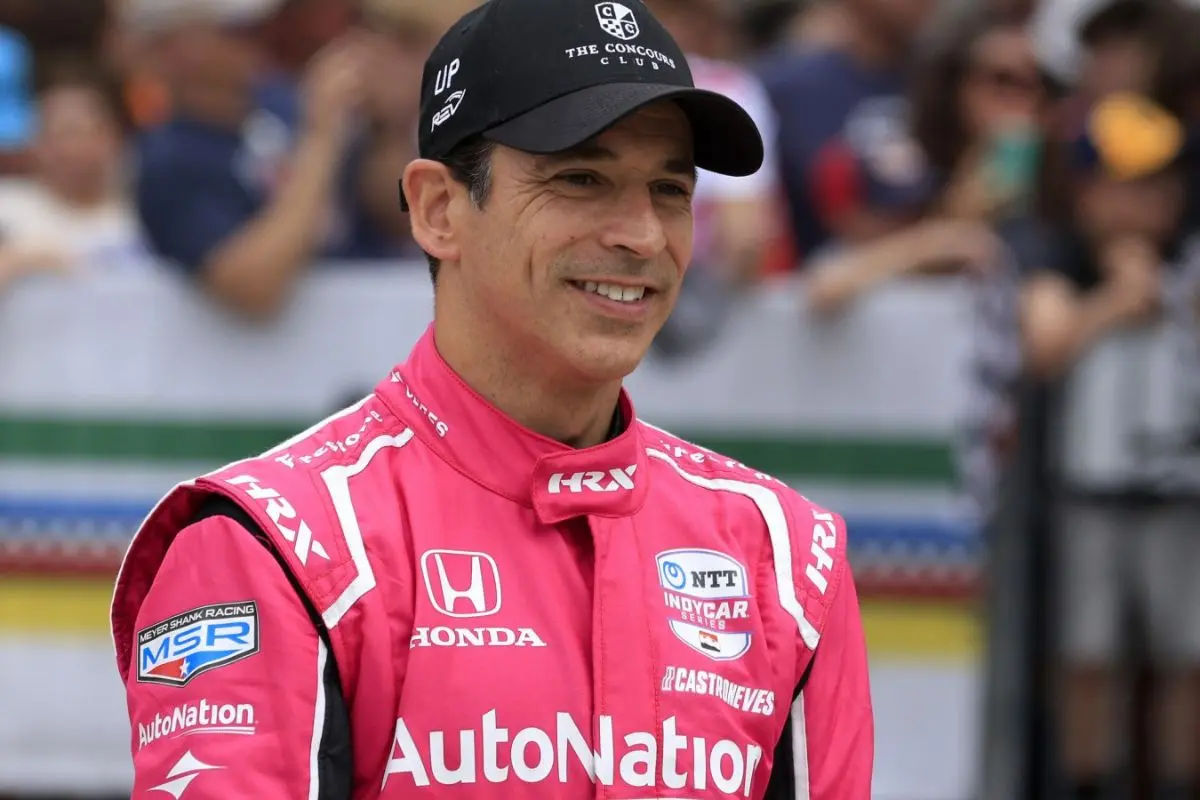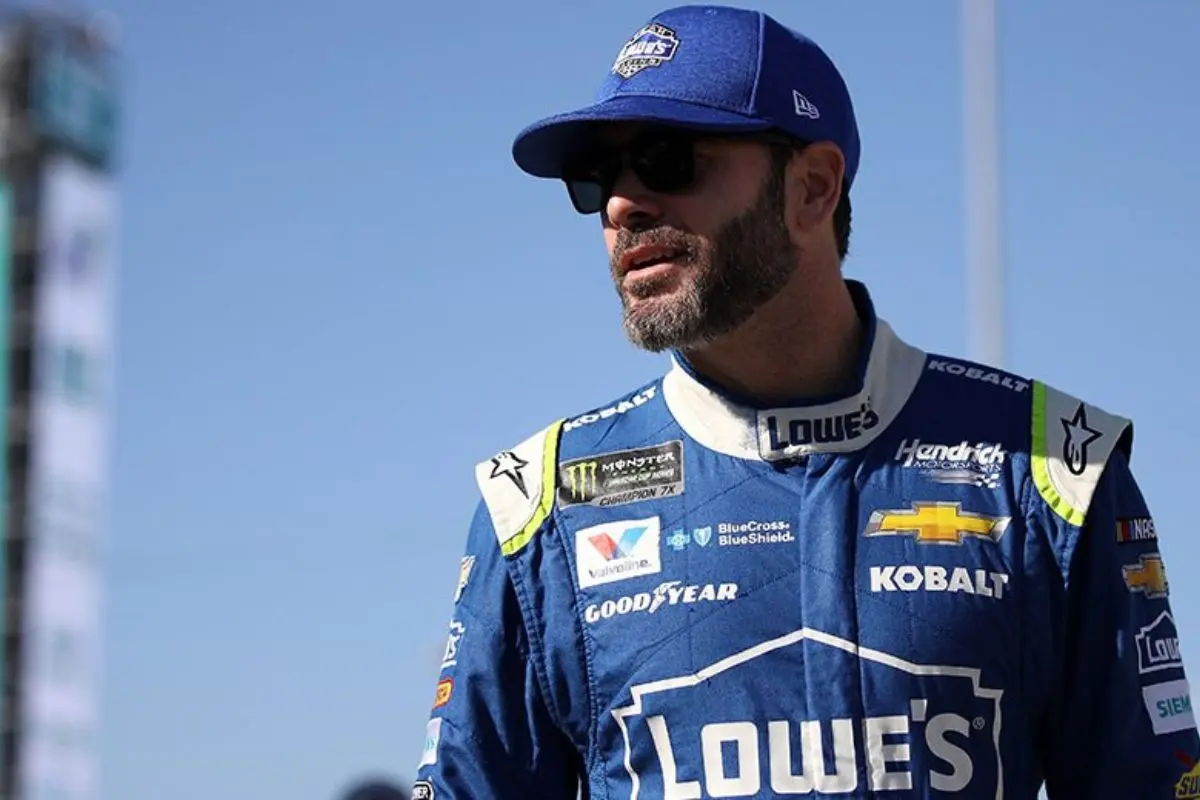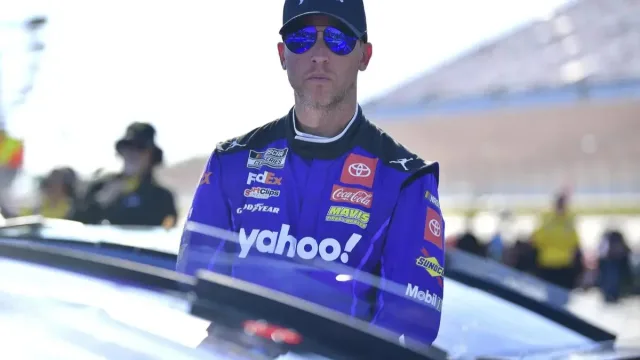Key Highlights
- Denny Hamlin criticizes new NASCAR regulations allowing guest drivers free entry, believing it undermines competition.
- He argues that the lack of traditional qualification standards affects the sport’s integrity and fairness.
- Hamlin emphasizes the need for guest drivers to prove their skills on the track like in the Indy 500.
- Concerns are raised about the potential impact of guest drivers on championship standings and playoff scenarios.
- He insists on maintaining NASCAR’s competitive framework and opposes regulations deviating from it.
Helio Castroneves’ Opportunity and the Open Exemption Provision
Although the Open Exemption Provision has sparked considerable debate within the NASCAR community, Helio Castroneves‘ opportunity to compete in the Daytona 500 brings to light both the allure and controversy surrounding this regulation.
Castroneves, a seasoned driver with an illustrious career in IndyCar racing, stands on the brink of joining an elite group alongside legends A.J. Foyt and Mario Andretti by potentially winning both the Daytona 500 and the Indy 500. This possibility undeniably adds an element of intrigue and excitement to his participation.
However, the Open Exemption Provision, which allows guest drivers like Castroneves a direct entry into such prestigious events, has faced criticism for potentially undermining the competitive integrity of the sport. Critics argue that it offers an undue advantage to outsiders, thereby sparking a broader dialogue about fairness and the preservation of NASCAR’s traditional competitive ethos.
Nonetheless, Castroneves remains unapologetic about seizing this golden opportunity.
 Trackhouse Racing Chose a Racing Legend for Daytona 500″ width=”1200″ height=”800″ srcset=”https://slicksandsticks.com/wp-content/uploads/2025/01/Why-Trackhouse-Racing-Chose-Helio-Castroneves.webp 1200w, https://slicksandsticks.com/wp-content/uploads/2025/01/Why-Trackhouse-Racing-Chose-Helio-Castroneves-300×200.webp 300w, https://slicksandsticks.com/wp-content/uploads/2025/01/Why-Trackhouse-Racing-Chose-Helio-Castroneves-1024×683.webp 1024w, https://slicksandsticks.com/wp-content/uploads/2025/01/Why-Trackhouse-Racing-Chose-Helio-Castroneves-768×512.webp 768w, https://slicksandsticks.com/wp-content/uploads/2025/01/Why-Trackhouse-Racing-Chose-Helio-Castroneves-630×420.webp 630w, https://slicksandsticks.com/wp-content/uploads/2025/01/Why-Trackhouse-Racing-Chose-Helio-Castroneves-150×100.webp 150w, https://slicksandsticks.com/wp-content/uploads/2025/01/Why-Trackhouse-Racing-Chose-Helio-Castroneves-696×464.webp 696w, https://slicksandsticks.com/wp-content/uploads/2025/01/Why-Trackhouse-Racing-Chose-Helio-Castroneves-1068×712.webp 1068w” sizes=”auto, (max-width: 1200px) 100vw, 1200px” />
Trackhouse Racing Chose a Racing Legend for Daytona 500″ width=”1200″ height=”800″ srcset=”https://slicksandsticks.com/wp-content/uploads/2025/01/Why-Trackhouse-Racing-Chose-Helio-Castroneves.webp 1200w, https://slicksandsticks.com/wp-content/uploads/2025/01/Why-Trackhouse-Racing-Chose-Helio-Castroneves-300×200.webp 300w, https://slicksandsticks.com/wp-content/uploads/2025/01/Why-Trackhouse-Racing-Chose-Helio-Castroneves-1024×683.webp 1024w, https://slicksandsticks.com/wp-content/uploads/2025/01/Why-Trackhouse-Racing-Chose-Helio-Castroneves-768×512.webp 768w, https://slicksandsticks.com/wp-content/uploads/2025/01/Why-Trackhouse-Racing-Chose-Helio-Castroneves-630×420.webp 630w, https://slicksandsticks.com/wp-content/uploads/2025/01/Why-Trackhouse-Racing-Chose-Helio-Castroneves-150×100.webp 150w, https://slicksandsticks.com/wp-content/uploads/2025/01/Why-Trackhouse-Racing-Chose-Helio-Castroneves-696×464.webp 696w, https://slicksandsticks.com/wp-content/uploads/2025/01/Why-Trackhouse-Racing-Chose-Helio-Castroneves-1068×712.webp 1068w” sizes=”auto, (max-width: 1200px) 100vw, 1200px” />
Denny Hamlin’s Strong Opposition to the New Regulations
Denny Hamlin has emerged as a leading critic of the new NASCAR regulations introduced ahead of the 2025 Cup season, expressing his discontent with what he perceives as a deviation from the sport’s traditional competitive framework. His vocal opposition is rooted in a belief that these changes, particularly offering free passes to guest drivers, undermine the competitive nature that defines NASCAR.
On his podcast, he conveyed a sense of frustration, describing the move as a desperate headline grab, and questioned the rationale behind allowing non-qualifying entries.
“My opinion on this was that it was desperate, I didn’t like it. I just thought that you’re really doing everything you can to try to get a headline and I still believe it to be true. NASCAR is the highest form of motorsports in the US. So why can’t we act like the big boys and say, ‘If you want to come over here and roll with us? Show me what you got! Go qualify in the race.’ It won’t be that hard. To me as a car owner, we just talked about these Playoff scenarios in which things can happen. Things out of your control can happen.” – Denny Hamlin
Hamlin, a seasoned driver and car owner, articulated concerns about fairness and the potential impact on playoff scenarios, emphasizing that external, uncontrollable factors could detrimentally affect outcomes.
Denny Hamlin’s Belief in Competitive Racing for Guest Drivers
As Denny Hamlin’s critique of the new NASCAR regulations emphasizes his concerns about maintaining the sport’s competitive integrity, his perspective on guest drivers highlights the need for these participants to demonstrate their skills on the track.
“I was one David Starr brake rotor away from winning a championship one year, but that’s the breaks. I’m wondering if David Starr, this is not a knock on David Starr, he was in a car that was not fit to make it all 312 laps. Let’s just say, because there’s been 40 cars in the last Phoenix race. David Starr was ALO, right? He got in, he played a factor in who won the race that day because of his name.”
“He got in, and maybe he didn’t blow a brake rotor. On a restart, he made a mistake and he wiped out one of the contenders. The old rule, he wouldn’t have been in the race because he didn’t qualify into the race. Now you’re just saying f***ing Tom Cruise can go in there, just cause he said he raced in Days of Thunder. Can come in there and compete with the big boys on Sunday, I don’t agree with that. That’s just my opinion on it.” – Denny Hamlin
Hamlin argues that allowing guest drivers to compete without proving their abilities weakens the essence of racing. He draws a comparison with notable events such as the Indy 500, where even acclaimed drivers like Kyle Larson and Fernando Alonso had to qualify, reinforcing the standard of excellence expected in motorsports.
Hamlin’s reference to the 2021 NASCAR Cup Series finale accentuates his assertion that competitive fairness is paramount. He points out how David Starr’s involvement, despite not qualifying under previous rules, impacted the race’s outcome, illustrating potential consequences of relaxed regulations.

NASCAR’s Open Exemption Provision (OEP) and Its Implications
The Open Exemption Provision (OEP) within NASCAR, applicable solely to the Daytona 500, introduces a remarkable dynamic to the racing landscape, attracting international drivers and potentially immersing the field into diversity.
This provision, though aimed at broadening NASCAR’s appeal and audience base, carries considerable implications for the championship. Since the Daytona 500 is a points race, any incidents involving exempted drivers could influence the championship standings. Consequently, the incorporation of the OEP necessitates careful consideration.
Key implications of OEP include:
- Increased Viewership: By introducing international drivers, NASCAR aims to attract a wider audience.
- Diversity of Competitors: A more diverse driver lineup can improve the competitive spirit of the race.
- Potential for Incidents: Less familiar drivers may inadvertently affect championship outcomes.
- Limited Practice Time: Current regulations restrict adequate practice time, potentially impacting performance.
Criticism from NASCAR Legends: Jimmie Johnson, Jeff Gordon, and Kevin Harvick
While the Open Exemption Provision (OEP) aims to broaden NASCAR’s appeal by inviting international drivers, it has met with criticism from several NASCAR legends who feel that the policy overlooks the contributions of seasoned drivers.
Jimmie Johnson, a seven-time Cup Series champion, was required to qualify on track, contrasting with the free passes now available.
Kevin Harvick expressed his discontent, acknowledging the intention to attract diverse talent but lamenting the exclusion of NASCAR’s own icons. Harvick argued that the sport should honor its past drivers, suggesting figures like Tony Stewart or Dale Earnhardt Jr. would naturally draw crowds.
“I love the intent, and I love the fact that it’s going to attract people from other forms of racing, but I don’t like the fact that it left us on our own… I can promise you that people are going to show up if a Tony Stewart or Dale Jr., myself, or Martin Truex, whoever, right? It would’ve opened the door to take care of your past drivers, and everybody would actually show up for it. I get it that we’re trying to expose it to the world, but forget about our own.” – Kevin Harvick
Jeff Gordon echoed similar concerns, questioning the criteria behind the OEP. He speculated whether it risked becoming a mere popularity contest, leaving legendary figures like Johnson in an uncertain position.
“What I’m questioning, or what I need more answers to, is what’s the criteria that dictates, who gets in and who doesn’t? Does it just become a popularity contest, and what again is the popularity are basing it off? Then you’ve got past champion and seven-time champion like Jimmie Johnson; where does he fit in that kind of criteria? That’s my only question about it all, and I don’t have all the answers, but that’s certainly something I’m going to ask NASCAR when I get a chance to.” – Jeff Gordon
These legends urge NASCAR to refine the OEP, ensuring it respects both innovation and tradition.

News in Brief: Denny Hamlin Accuses NASCAR of Weakening the Sport
In conclusion, Denny Hamlin’s criticism of NASCAR’s Open Exemption Provision highlights a notable debate within the sport, as he argues that allowing guest drivers to bypass competitive processes undermines the integrity of racing.
While NASCAR legends like Jimmie Johnson, Jeff Gordon, and Kevin Harvick also voice concerns, the provision remains controversial, offering opportunities for drivers like Helio Castroneves. This situation presents a complex intersection of tradition and innovation, challenging NASCAR to balance accessibility with maintaining competitive standards.
ALSO READ: Denny Hamlin’s Criticism of Earnhardts Sparks Heated Debate as Fans Clash Over His Opinion
